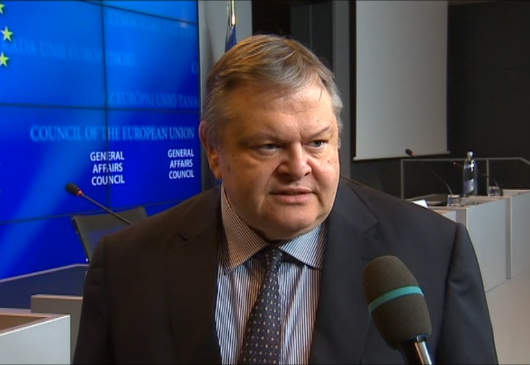 E. VENIZELOS: Today’s General Affairs Council essentially brings to an end the six months of the Hellenic Presidency – Greece’s fifth Presidency since its accession to the European Communities.
E. VENIZELOS: Today’s General Affairs Council essentially brings to an end the six months of the Hellenic Presidency – Greece’s fifth Presidency since its accession to the European Communities.
At today’s Council, we heard very warm and positive words on behalf of the European Commission and on behalf of the member states, who recognize the work and contribution of the Hellenic Presidency in shaping a new European environment; an environment that must respond to citizens’ demands, which were expressed in the European elections. We will have the opportunity to present the long list of the Hellenic Presidency’s achievements.
At today’s General Affairs Council, we agreed on a new European Strategy for Maritime Security and a new policy for the Adriatic and Ionian macroregion. Both of these are very important for a maritime, marine country like Greece. This is very important because it was our main, horizontal priority for the semester of the Hellenic Presidency.
The Council also decided today to grant candidate-country status to Albania. This is very important, because it stabilizes the Western Balkans, because it promotes the bilateral relations between Greece and Albania; an Albania that perceives how great the Greek Presidency’s contribution was. Other countries of the region, like FYROM, have had candidate-country status since 2005. We are sending a message of friendship, cooperation to Albania, to the Albanian government, to the Albanian political system, and we are certain that our Albanian friends understand that there is an institutional and political frame of reference. This frame of reference is the Copenhagen political criteria, respect for the European acquis, respect for international law, including the principle of good neighbourly relations. This message is a joint message of the 28 member states of the European Union and of the European Commission. I believe that this will be capitalized on in the best possible manner, so that at some point, as soon as possible, the accession negotiations can begin.
During our time in the Presidency, we had the opportunity to see the opening of the accession negotiations with Serbia and to promote Montenegro’s European course. Thus, Greece has pointed up its role, its credibility and its effectiveness in the Western Balkan region – but not just in this region: throughout the southern neighbourhood, throughout the region of the Middle East and North Africa, with everything that we hosted during our Presidency, like the Ministerial Meeting between the countries of the EU and the countries of the Arab League. So it is very important that these things took shape today.
But we also had the opportunity to talk about the European Council that will be convening later this week; a European Council that is being called upon to decide on the new personnel at the main European Organs. The European Council will make a very important decision on who will be the new President of the European Commission. This is very important institutionally and democratically, because it respects the terms of the Lisbon Treaty and the will of the citizens of the EU. But this is also very important, in essence, because the European Commission is taking on responsibility for introducing measures, policies, initiatives that respond to European citizens’ needs for growth, for competitiveness, for the creation of new jobs, as the great danger is that there should cease to be a European social state – we cannot accept this. The problem is always unemployment – and youth unemployment in particular. And on these two major issues there needs to be a response; a response that the new European Commission is being called upon to provide.
June 24, 2014


